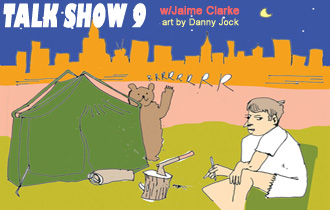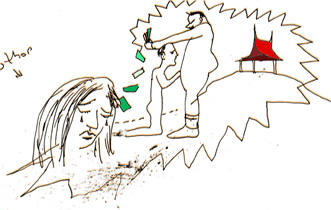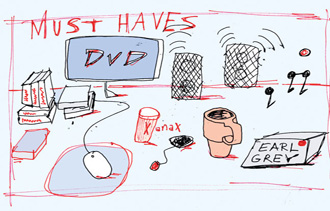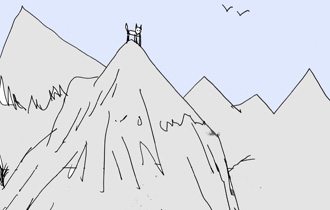Talk Show 9: with Jami Attenberg, Adam Braver, Nina de Gramont, Ann Hood, and Moon Unit Zappa
02.03.08
 TALK SHOW 9: Place You Would Never Visit
TALK SHOW 9: Place You Would Never Visit
Jami Attenberg is the author of the story collection Instant Love and the novel The Kept Man. She has written for Jane, Print, Nerve, Nylon, Salon, the San Francisco Chronicle and others. Visit her online at jamiattenberg.com.
Adam Braver is the author of Mr. Lincoln’s Wars, Divine Sarah, and Crows Over the Wheatfield. His work has appeared in journals such as Daedalus, Ontario Review, Cimarron Review, Water-Stone Review, West Branch, and Post Road. He teaches at Roger Williams University in Bristol, RI, and is a Writer-in-Residence at the NY State Summer Writers Institute. Visit Braver at www.adambraver.com.
Nina de Gramont is the author of a short story collection, Of Cats and Men, and the co-editor of an anthology, Choice. Her first novel, Gossip of the Starlings, is forthcoming in June, 2008. Her work has appeared in Isotope, Nerve, Exquisite Corpse, Post Road, Seventeen, and The Harvard Review. Visit de Gramont at www.choice-stories.com
Ann Hood is the author of seven novels, including The Knitting Circle and Somewhere off the Coast of Maine; a short story collection, An Ornithologist’s Guide to Life; and a memoir, Do Not Go Gentle: My Search for Miracles in a Cynical Time. Her latest book, Comfort: A Journey through Grief will be published in May. She lives in Providence, RI.
Moon Unit Zappa is the author of the novel America the Beautiful and has written for Details and Harper’s Bazaar. She lives in L.A.
––Name a place you have no interest in visiting and why.
Attenberg: Thailand. First off it’s a super long flight and I know everyone says just take a sleeping pill and you’ll be fine, but I will NOT be fine. I can barely make it on a flight to the west coast without losing it. And I know a great deal of their economy is dependent on the tourist industry and that kind of environment usually does not appeal to me. I think the child prostitution problem there might depress the hell out of me as well.
Braver: Anywhere that involves camping and the outdoors—more specifically, I never want to be anywhere that isn’t within about thirty minutes of a metropolitan area. And by thirty minutes, I mean thirty minutes by car (although I suppose there could be an exception made if an emergency services vehicle could be on the scene during that same thirty minute window).
de Gramont: Israel. It’s not that I have no interest in visiting Israel. How could I not want to visit Israel? I would dearly love to see Bethlehem, and Jerusalem, and pay my respects at Yad Vashem. I would love to spend a summer on a kibbutz; I see myself in a garden, wearing a kerchief, living off the earth in strength and cooperation with others. But every time I look at a map of the Middle East I see Israel—this teeny tiny country surrounded by enormous countries that hate it. The only protection is its fierce, well-organized army and its far away big brother, the U.S. Looking at a map of the Middle East makes me sad, and makes me think: I would never, ever go to Israel.
Hood: The night I met my future husband Lorne, he tried to impress me by describing his trekking in Nepal. After I listened to descriptions of the freezing temperatures, bad food, altitude sickness, stomach problems, and dirty accommodations, I said: “If that’s your idea of fun, this will never work out.” He then tried to tell me how easy it was, how beautiful the views were, how exhilarating an experience it was. But here’s the truth, I don’t hike, trek, or climb. Anything. Anywhere. I am so afraid of heights that I can’t even climb the stairs in the Eiffel Tower. I admire Italy’s Duomo’s from the piazzas below. I don’t mind rough travel, or exotic travel. In fact, I love exploring Cambodia, Peru, China, anywhere that does not require special equipment or extra oxygen. Since that night sixteen years ago, Lorne has climbed mountains in Africa, Russia, Japan, and Chile. Alone. Each time he invites me along and each time I say no. He has tried to convince me to go by talking about stopovers in Moscow or a Kenyan safari.
Zappa: I have several places I have no interest in ever visiting—India, Mexico, anywhere by car, plane or sea, a bad guy’s lair, twister alley, anywhere flat, anywhere too switch-backy, jail, any courtroom where I would have to testify and my in-laws. But I think I’ll go with outer space as my top travel destination to avoid. Mainly because you’d be solely at the mercy of the government. The irony of that much space and no privacy. Nothing of comfort, nothing of any aesthetic value (besides a landscape you can’t really interact with without a mechanical device and an audience). Plus you’d wear diapers and asteroid/atmospheric turbulence seems like a motherfucker.
 ––What are your preconceptions about this place?
––What are your preconceptions about this place?
Attenberg: Beautiful beaches, decadence, and wandering souls. There are all those stories about sweet young English women visiting Thailand and getting caught smuggling heroin in their private areas because some hot guy told them to, and then being sent to jail for five hundred years. Also I feel like it’s the kind of place where you would be sitting on a beach having a peaceful moment and then some vaguely European dude named Corazon with white guy dreadlocks and scabs on his arms would come up and want to talk about living off the earth and then try to sell you weed. Basically my fear is that I would end up meeting annoying travelers who are living there because it’s so cheap and I would have to pretend I liked them when I didn’t.
Braver: It seems to me that there will be an almost crazy inherent need to adapt to some model of survival living. For example, in terms of medical emergencies, I have very little interest in the First Aid kit—particularly the wilderness version that has the snake bite kit. Besides having no desire to see a snake (especially a biting snake), I have even less interest in making small incisions into a friend’s leg, and orally vacuuming out venom in tandem with a gray rubber suction cup. My preconception is that one will get caught up in the gestalt of the survival experience, when, for example, a hospital would seem much more practical and wise.
de Gramont: That it’s dry and dusty, and filled with the most sacred and magical history. That I would be welcomed as a citizen because my mother is Jewish, and that there would be terrorists around every corner wanting to kill me.
Hood: The aforementioned freezing temperatures, bad food, altitude sickness, stomach problems, and dirty accommodations.
Zappa: That we’ve never really been there and that if we have, all we do is put missiles and spy satellites in space aimed at all the rest of the places on the planet the right wing Republicans want to control and/or make money from. Yunno, Big brother HQ.
 ––What would it take to convince you to visit?
––What would it take to convince you to visit?
Attenberg: I would go if Anthony Bourdain would come with me and take me on one of his magical food tours. Whenever I visit a new city and am hungry I always ask myself, “What would Tony do?”
Braver: I think it would take a well crafted, very convincing lie. Maybe something about the harmony of nature. Or the freeing experience of the mind. Or maybe that we’re going to Paris.
de Gramont: The Jews and the Arabs would realize that they are the same people, and they would make peace with each other. The bombings would stop, the PLO would disband, and Palestinians and Israelis would be happily living in the same neighborhoods, and working together on that kibbutz.
Hood: I can’t think of anything that would get me on a mountain top.
Zappa: If my family could come with me I’d go. Anywhere our daughter Mathilda is is where I’m always happy to be. I’d need some great books, internet access, freeze dried earl grey tea with milk and two sugars, a kickass sound system with my favorite music, plus the shows I’d be missing on DVD and a lotta Xanax for the ride up and back.
 ––What do you imagine would happen if you DID visit?
––What do you imagine would happen if you DID visit?
Attenberg: My boyfriend went there last year to work on a documentary where they brought Katrina survivors to meet tsunami survivors. He hung out with lots of amazing Thai people and would go to these small fishing villages where he and his group would be greeted by songs and feasts. It was really a beautiful and important experience for him. But I always attract the Euro hippies, no matter what I do, so I would probably not have the same experience.
Braver: I’m almost certain that I would never sleep. During the day, I might believe the lie that got me there, convincing myself how fortunate I am to be in nature, intellectualizing a rationale about simpler times where all one had was the land, the solitude of spending my days amongst lakes and trees without the confines of the modern world. And for the most part I suspect that could be true. But night would be a different story. Never mind the blow up mattresses that lose their air by the middle of the night. Or negotiating the cold air with the inferno heat of the sleeping bag (or just the sleeping bag!).
Mostly, I imagine laying awake all night, hoping that I don’t have to go the bathroom, because should I need to go, it would mean having to get dressed, finding the flashlight, unzipping the tent, stumbling through a pitch black forest, stealthily avoiding hungry bears, walking in a way where every footstep sounds as though it echoes throughout the entire woods, before getting to a flickeringly fluorescent bathroom where the urinal cakes smell of piss, where there are shivering snakes in the stalls, or, where leaned up against the sink and staring at the ceiling, is a man who is contemplating leaving his family.
de Gramont: I imagine that I would die or witness some terrible, life-altering violence. Or else, I would just be worrying about that happening every minute. When I hear about people bringing their children to Israel I think they must be crazy. It may very well be the last place one earth I would ever bring my child, which is sad, because I’d love for her to see it. I’d love to see it myself.
Hood: Katmandu sounds exotic, even exciting. But I imagine that if I went to Nepal and trekked, I would fall from the Himalayas to my death. No. I don’t imagine that would happen. I’m certain it would happen.
Zappa: That once I was debriefed, I’d be on every talk show and asked A LOT of questions I couldn’t answer truthfully, to the point I’d be more famous than the sun, more famous than Posh and Beckham even, but as internally conflicted as the middle east. At that point, at least I’d be known as an ambassador—no, better—emissary of earth and I could retire on the spin-off merchandise, bio pics, and endorsements.
 ––What advice would you give this place to attract people like you as tourists?
––What advice would you give this place to attract people like you as tourists?
Attenberg: I probably should be their target demographic already. A lot of my friends have gone and rented a hut on a beach for, like, a nickel, and totally loved it. The Thailand tourism folks are doing everything right. It’s just my problem.
Braver: My first instinct is to make a laundry list that includes getting rid of the bugs and the creepy reptiles, installing an emergency response system, perhaps building a hospital, a bakery with fresh bread would be nice—although I’d settle for a place that served a good cup of coffee before 8 AM, access to a bathtub, a little noise—but not the noise of generators and battery-powered TVs and Winnebagos, maybe a few less ghost stories, food not cooked and eaten off sticks, and, and . . . I could keep on with the list, but I realize I’m only making the outdoors into my home, and if the outdoors is my home, then there are no outdoors for me to escape to. Even if I never want to go there.
de Gramont: Peace. Peace. Peace.
Hood: I suppose the Nepal tourist bureau could get me there for a trek if they announced that inexplicably Nepal had dropped 15000 feet and it was now possible to visit Katmandu and trek in its lovely valleys.
Zappa: Downplay the re-entry turbulence and mechanical defects. More footage of the fun to be had with gravity.
Jaime Clarke is the author of the novel WE’RE SO FAMOUS, editor of DON’T YOU FORGET ABOUT ME: CONTEMPORARY WRITERS ON THE FILMS OF JOHN HUGHES, and co-founder of POST ROAD, a national literary magazine based out of New York and Boston.